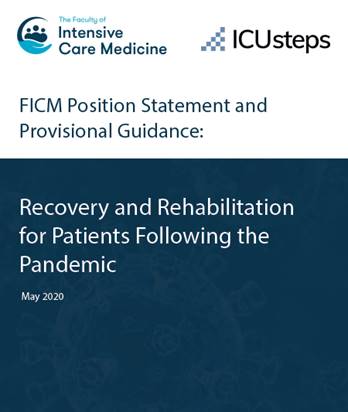ICUsteps statement
ICUsteps welcome the Faculty of Intensive Care Medicine’s (FICM) position statement and provisional guidance “Recovery and Rehabilitation for patients following the Pandemic”.

for patients following
the Pandemic
We have had personal experience of the profound consequences of critical illness, either as patients or relatives, or as healthcare professionals, of the suffering caused by the lack of rehabilitation and support during the long recovery period.
There is often little or no awareness from community healthcare professionals and the general public about the aftermath of critical illness for patients and their families. The experience of critical care can be brutal for patients, with delirium, confusion and distressing treatments. And as FICM’s position statement makes clear, the aftermath includes problems with breathing, eating and digestion, extreme fatigue and weakness, hair loss, significant psychological distress, impaired cognitive abilities (such as inability to concentrate or to think clearly), sexual dysfunction and an array of other issues.
COVID-19 adds additional trauma for patients, including increased delirium, the disorientation and difficulties of communication when staff are wearing personal protective equipment and separation from their families.
Relatives too suffer considerable psychological distress, which requires support once the patient is discharged, or if they are bereaved.
“Critical care may save our lives, but we need support and rehabilitation to give those lives back to us.”
For too long, patients have been discharged home after a critical illness without support, information or rehabilitation. This is not acceptable. We call for the government to commit to funding Critical Illness Recovery Services for intensive care patients, as laid out in the FICM guidance. We also ask that all critical care patients (not just COVID-19 patients) receive rehabilitation and information when they are discharged from hospital, to support them before they attend their follow up appointment at 8-12 weeks.
Critical care may save our lives, but we need support and rehabilitation to give those lives back to us.
Case study:
Jill had severe sepsis which caused multi organ failure and she required breathing support through a tracheostomy. She had 14 nights in intensive care. She found treatment in ICU very distressing, she had confused memories of that time and suffered from delirium. She had 2 nights on a general ward, before being discharged home. She could barely walk, could only eat small amounts of food and she had lost a lot of weight. She was given no information about what would help her or what to expect in her recovery. She had no after support or rehabilitation. A district nurse came twice to change her tracheostomy dressings. Her recovery took 14 months. During that time, she had to learn to breathe, walk, sleep and eat again. She had flashbacks, mood changes, she was exhausted, very weak, she had hair loss and skin problems and had to try and piece back her life with no guidance. She commented that she did not know it was possible to suffer so much.
ICUsteps is a patient and relative intensive care support charity. We provide information, support groups and understanding to those on the long road of recovery from critical illness.